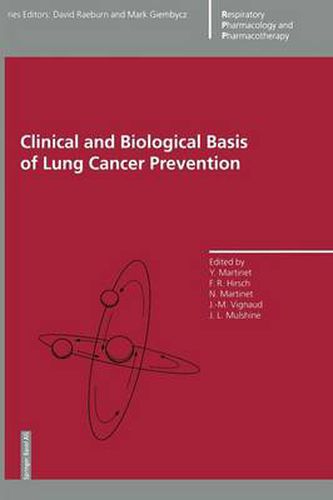Readings Newsletter
Become a Readings Member to make your shopping experience even easier.
Sign in or sign up for free!
You’re not far away from qualifying for FREE standard shipping within Australia
You’ve qualified for FREE standard shipping within Australia
The cart is loading…






This title is printed to order. This book may have been self-published. If so, we cannot guarantee the quality of the content. In the main most books will have gone through the editing process however some may not. We therefore suggest that you be aware of this before ordering this book. If in doubt check either the author or publisher’s details as we are unable to accept any returns unless they are faulty. Please contact us if you have any questions.
Lung cancer is a disease with pandemic public health implications as it is now the leading cause of cancer mortality throughout the world. This book results from two recent International Association for the Study of Lung Cancer (IASLC) Workshops on lung cancer prevention. It strikes a balance between considering public health approaches to tobacco control and population-based screening, advances in clinical evaluation of chemoprevention approaches, and the biology of lung carcinogenesis. Indeed, while the science of smoking cessation is evolving as new pharmacological tools are moving into clinical evaluation, the current impact of molecular diagnostics is profound. The rapidly-evolving diagnostic technologies are revolutionizing basic scientific investigation of cancer, and this trend is expected to soon spill over into the clinical practice of medicine. The evolution of economical diagnostic platforms to allow for direct bronchial epithelial evaluation in high-risk populations promises to improve the diagnostic lead-time for this disease. The hope is that enough progress will occur to permit lung cancer detection in advance of clinical cancer so that the disease can be addressed early on, while it is still confined to the site of origin. Chemoprevention, which is designed to intervene in the early phase of carcinogenesis prior to any subjective clinical manifestation of a cancer, is also generating greater research interest. Moreover, the benefit of aerosolized administration of chemoprevention agents over conventional oral administration has strong appeal and may result in the reduction of the incidence of cancer when combined with new diagnostic technologies.
$9.00 standard shipping within Australia
FREE standard shipping within Australia for orders over $100.00
Express & International shipping calculated at checkout
This title is printed to order. This book may have been self-published. If so, we cannot guarantee the quality of the content. In the main most books will have gone through the editing process however some may not. We therefore suggest that you be aware of this before ordering this book. If in doubt check either the author or publisher’s details as we are unable to accept any returns unless they are faulty. Please contact us if you have any questions.
Lung cancer is a disease with pandemic public health implications as it is now the leading cause of cancer mortality throughout the world. This book results from two recent International Association for the Study of Lung Cancer (IASLC) Workshops on lung cancer prevention. It strikes a balance between considering public health approaches to tobacco control and population-based screening, advances in clinical evaluation of chemoprevention approaches, and the biology of lung carcinogenesis. Indeed, while the science of smoking cessation is evolving as new pharmacological tools are moving into clinical evaluation, the current impact of molecular diagnostics is profound. The rapidly-evolving diagnostic technologies are revolutionizing basic scientific investigation of cancer, and this trend is expected to soon spill over into the clinical practice of medicine. The evolution of economical diagnostic platforms to allow for direct bronchial epithelial evaluation in high-risk populations promises to improve the diagnostic lead-time for this disease. The hope is that enough progress will occur to permit lung cancer detection in advance of clinical cancer so that the disease can be addressed early on, while it is still confined to the site of origin. Chemoprevention, which is designed to intervene in the early phase of carcinogenesis prior to any subjective clinical manifestation of a cancer, is also generating greater research interest. Moreover, the benefit of aerosolized administration of chemoprevention agents over conventional oral administration has strong appeal and may result in the reduction of the incidence of cancer when combined with new diagnostic technologies.